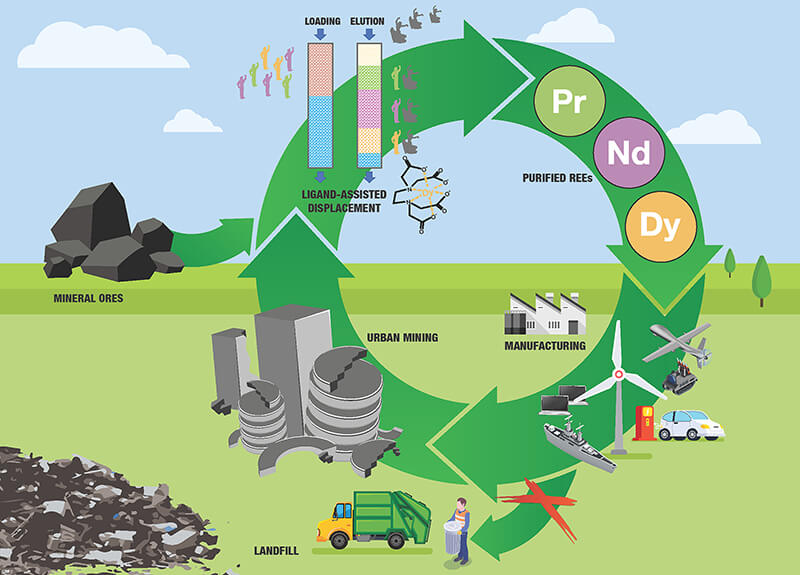May 6, 2020
New Purdue technologies to extract, purify critical rare earth metals could be a ‘game changer’ to advance, protect vital electronics

Mining for rare earth metals could become economically and environmentally feasible though a process developed and patented at Purdue University. (File image)
Purdue startup obtain rights to environmentally friendly extraction and purification technology
WEST LAFAYETTE, Indiana – The production of rare earth metals is a global $4 billion annual market that continues to grow as new electronics, computerized engines for aircraft, warships, electric automobiles, magnets and other critical products are developed that need rare earth metals to perform. The value of the products that require rare earth metals to function is valued at more than $4 trillion per year.
The current challenge is that just one country, China, owns the market on extracting and purifying this critical resource despite the fact that other global countries, including the U.S., are rich in such metals. The detrimental environmental impact of current acid based separation and purification of rare earth metals prohibits most companies across the globe from entering the market.
New environmentally friendly technologies promise to be “game changers” in this field and enable the U.S. to create a more stable and reliable domestic source of these essential metals. Purdue University-patented extraction and purifying processes using ligand-assisted chromatography are shown to remove and purify such metals from coal ash, recycled magnets and raw ore safely, efficiently and with virtually no detrimental environmental impact.
“It’s a supply chain challenge with wide implications on the U.S. economy and national security. We have a critically needed product and one dominant source for this product. This new patented process promises to enable U.S. independence from the China near monopoly,” said Dan Hasler, founder of Hasler Ventures. “This technology has been researched and developed at Purdue University for more than a decade and has proven to be versatile and robust.”
Hasler Ventures has secured rights from the Purdue Research Foundation that grant the company first rights to commercialize the technology’s intellectual property.
 Graph illustrates an environmentally friendly ligand-assisted chromatography method to help produce purified rare earth metals from waste magnets to ensure a robust supply of critical materials for electronics. (Illustration provided by Linda Wang)
Download image
Graph illustrates an environmentally friendly ligand-assisted chromatography method to help produce purified rare earth metals from waste magnets to ensure a robust supply of critical materials for electronics. (Illustration provided by Linda Wang)
Download image
The technology – developed and patented from the laboratory of Nien-Hwa Linda Wang, Purdue's Maxine Spencer Nichols Professor of Chemical Engineering – has successfully shown to separate the rare earth metals without the devastating environmental effects of conventional acid based methods with high yield and purity.
One part of this technology was published March 31 in the Royal Society of Chemistry publication Green Chemistry. Visit here for the article. The funding source for this research includes the Department of Defense.
“About 60% of rare earth metals are used in magnets that are needed in almost everyone’s daily lives. These metals are used in electronics, airplanes, hybrid cars and even windmills,” Wang said. “We currently have one dominant foreign source for these metals and if the supply were to be limited for any reason, it would be devastating to people’s lives. It’s not that the resource isn’t available in the U.S., but that we need a better, cleaner way to process these rare earth metals.”
According to Wang, after China reduced the export quotas for rare earth metals in 2010, the costs of rare earth magnets for one wind turbine increased from $80,000 to $500,000. After China relaxed the export restrictions 18 months later, the prices returned to lower levels than in 2010.
“Conventional methods for producing high-purity rare earth elements employ two-phase liquid–liquid extraction methods, which require thousands of mixer-settler units in series or in parallel and generate large amounts of toxic waste,” Wang said. “We use a two-zone ligand-assisted displacement chromatography system with a new zone-splitting method that is producing high-purity (>99%) metals with high yields (>99%).”
Wang’s ligand assisted method has the potential for efficient and environmentally friendly purification of the rare earth metals from all sources of recyclates, such as waste magnets and ore-based sources and helps transform rare earth processing to a circular, sustainable process.
“We continue to work diligently in the lab to learn how to adapt the ligand-assisted system to many variations we see in source material and are excited to collaborate with and assess the suitability of potential partners source material be it recycled magnets and batteries, coal ash or domestically mined ore.
Joe Pekny, a Purdue professor of chemical engineering said Wang’s innovation enables the U.S. to reenter the rare earth metals market in a significant way and sustainable way.
“What’s exciting is that the U.S. has the rare earth metals to meet the growing demands of the U.S. market and other markets around the globe and reduces our dependence on foreign sources,” Pekny said. “Linda’s method replaces a very inefficient process and replaces it with an earth-friendly, safe extraction process.”
About Hasler Ventures
Hasler Ventures is a Florida LLC founded in partnership with Purdue University and the Purdue Foundry to enable the creation of a U.S. rare earth metal chain through novel rare earth metals extraction and purification technologies.
About Purdue Research Foundation Office of Technology Commercialization
The Purdue Research Foundation Office of Technology Commercialization operates one of the most comprehensive technology transfer programs among leading research universities in the U.S. Services provided by this office support the economic development initiatives of Purdue University and benefit the university's academic activities through commercializing, licensing and protecting Purdue intellectual property. The office recently moved into the Convergence Center for Innovation and Collaboration in Discovery Park District, adjacent to the Purdue campus. In fiscal year 2019, the office reported 136 deals finalized with 231 technologies signed, 380 disclosures received and 141 issued U.S. patents. The office is managed by the Purdue Research Foundation, which received the 2019 Innovation and Economic Prosperity Universities Award for Place from the Association of Public and Land-grant Universities. In 2020, IPWatchdog Institute ranked Purdue third nationally in startup creation and in the top 20 for patents. The Purdue Research Foundation is a private, nonprofit foundation created to advance the mission of Purdue University. Contact otcip@prf.org for more information.
Writer: Cynthia Sequin, casequin@prf.org
Sources: Dan Hasler, hasler.dan@gmail.com
Nien-Hwa Linda Wang, 765-494-4081, wangn@ecn.purdue.edu
Joe Pekny, pekny@combination.com

